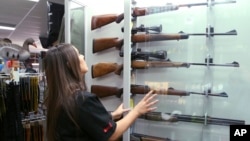Every time there is a mass shooting in the United States, a debate about reforming the nation’s gun laws begins anew, as it has this week following the shooting at a high school in Florida that killed 17 people.
Gun-control advocates often cite stricter gun laws and lower incidence of gun violence in several other democracies, like Canada, Japan and Australia.
Here’s a look at how some of the global approaches compare:
The United States
Gun ownership in the United States is rooted in the Second Amendment of the U.S. Constitution. “A well-regulated militia, being necessary to the security of a free state, the right of the people to keep and bear arms, shall not be infringed.” Gun advocates consider ownership a birthright and an essential part of America’s heritage. Federal law provides the basis for firearm regulation in the United States, but states and cities can impose regional restrictions.
Canada
Like the United States, Canada has federal gun restrictions that can be supplemented by provinces, territories and municipalities. All gun owners are required to be older than 18 years of age, obtain a license that includes a background check and complete a public safety course. All guns fall under three categories: unrestricted, restricted and prohibited. Ordinary rifles and shotguns are unrestricted; handguns, semiautomatic rifles and shotguns, as well as sawed-off rifles and shotguns are restricted; and all automatic weapons are prohibited.
Australia
After 35 people were killed in a mass shooting in Tasmania in 1996, the federal government passed a law banning all automatic and semiautomatic firearms, as well as tightened licensing and ownership rules. They also started a buyback program that took more than 650,000, about one-sixth of the national stock, out of circulation. The law also required those with gun licenses to demonstrate a “genuine need” for a particular type of gun, which doesn’t include self-defense, and to take a firearm safety course. Licensees also must meet storage requirements that include keeping ammunition stored separately and abide by a waiting period of 28 days.
United Kingdom
After a gunman killed 16 children and one teacher at a school in Dunblane, Scotland, in 1996, Great Britain passed its strictest gun laws yet. Handguns are not permitted among the general populace, but there are allowances for firearms and shotguns that can be obtained from the police. Self-defense is not seen as a reason to own firearms.
Finland
Handgun license applicants are allowed to purchase firearms only if they can prove they are active members of regulated shooting clubs. Before they can get a gun, applicants must pass an aptitude test, submit to a police interview and show they have a proper gun storage unit.
Japan
Under the firearm and sword law, the only guns permitted are shotguns, air guns, guns that have research or industrial purposes, or those used for competitions. Before being allowed to own specialty weapons, a licensee has to obtain formal instruction and pass a battery of written, mental and drug tests, as well as a rigorous background check. Owners must also inform the authorities of how the weapon and ammunition is stored and provide the firearm for annual inspection.
Singapore
The small Asian nation has perhaps the strictest gun laws in the world. Ordinary citizens are not allowed access to any firearms. If a person is caught with a gun, the punishment is “caning” (physical punishment, usually with a cane). If someone tries to use a weapon, the punishment is death. If someone is caught with more than one weapon, it is assumed they are trafficking arms and can be punished by death or life in prison.





